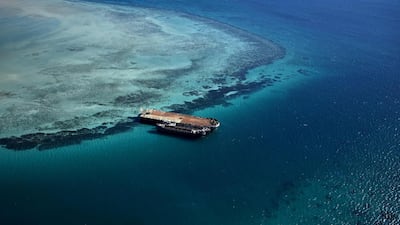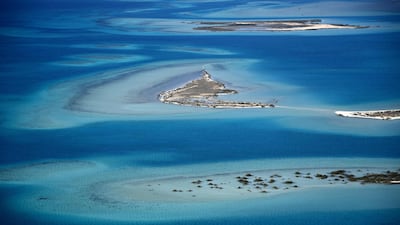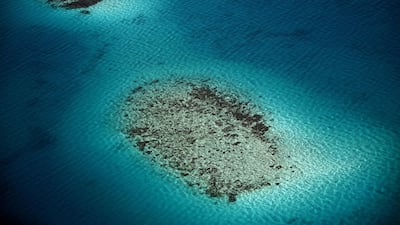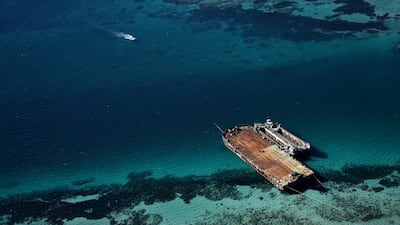Saudi Arabia will merge two government-owned developers working on its Red Sea tourism project into a single entity to cut costs and and boost synergies, as the kingdom accelerate the development of its nascent tourism industry.
The Red Sea Development Company (TRSDC) and Amaala, owned by the kingdom's sovereign wealth fund, the Public Investment Fund, are developing adjacent mega projects on the country's west coast.
They will soon be unified under the "Red Sea Group" to increase efficiencies, John Pagano, who is chief executive of both companies, said in an interview on Tuesday.
"What it allows us to do is to leverage our synergies between the two projects," Mr Pagano said.
"It allows us to leverage the skill sets within both organisations for the betterment of both projects and we're in the final stages of that being formalised.
"We [TRSDC] are a good year or more ahead of where they [Amaala] are and so all the lessons we've learnt we apply them over there and vice versa."
The large-scale projects being developed by companies such as Amaala and TRSDC are part of the kingdom's efforts to diversify and cut its dependence on sale of hydrocarbons for revenue.
Development of non-oil sectors such as tourism are key planks of the kingdom's Vision 2030 economic transformation agenda.
Amaala, an ultra-luxury destination focused on wellness, plans to raise between five billion Saudi riyals ($1.3bn) and 10 billion riyals ($2.7bn) in 2022 to help fund the first phase of the project, Mr Pagano said.
"We will probably come to market next year with Amaala," he said.
"It will be conventional senior debt secured against the assets that we're building and the eventual income produced by those assets, which will then service the debt."
The first phase of the Amaala project will comprise nine hotels, delivering about 1,300 hotel rooms. It is on track for completion by mid-2024, he added.
TRSDC, which raised 14bn riyals in green financing earlier this year, will tap the debt market for financing of its subsequent phases but currently does not have capital requirement for the first phase.
"[For] subsequent phases, depending on the timing, [we] will come back to the market," Mr Pagano said. "It's a mix of equity and debt to get the right balance."
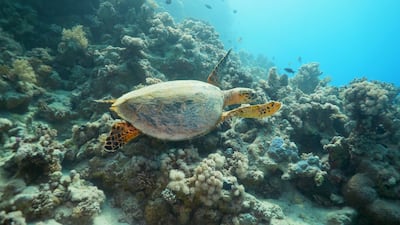
TRSDC awarded contracts worth 14.5bn riyals in 2020 as the company pushes ahead with the construction of the mega tourism project.
The company will award another 18bn riyals worth of contracts in the next 18 months as it begins construction of hotels and an airport, Mr Pagano said.
TRSDC is developing 16 hotels with 3,000 rooms across five islands and two inland sites as part of the first phase of the project on Saudi Arabia’s west coast.
The project is expected to welcome its first guests by the end of 2022, when the international airport and first hotels are due to open.
"We are signing today a number of hotel deals," Mr Pagano said at the sidelines of the Arabian and African Hospitality Investment Conference in Dubai.
The hotel brand deals will be announced during the Future Investment Initiative summit in Riyadh in October.
To keep up with the increasing pace of work, the company will hire more than 700 employees in the next 12 months, Mr Pagano said.
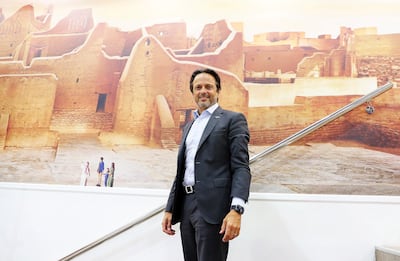
TRSDC will have a total workforce of 1,000 people in the next few weeks and Amaala has a 500-strong workforce.
Going forward, the company is mulling a real estate investment trust (Reit) as a future financing option and it has not ruled out tapping capital markets through a public listing, Mr Pagano said.
A Reit "is another possible way to take the assets and put them into an investment vehicle that's open to a much broader universe of investors," he said. "So you can open it up to retail investors as well as institutional investors."
TRSDC, which says it abides by standards of regenerative tourism, will operate using the world's largest battery storage system, which will be built by Acwa Power.
Such renewable energy solutions cost more but are "no longer an optional extra" because consumers are demanding more sustainability measures from the hospitality industry, he said.
Saudi Arabia is "the most happening hospitality market in the world today, there's no other country in the world that is showing such growth in that industry," he said.
"The leisure piece of the hospitality space is happening in Saudi Arabia at a scale that's unprecedented."
